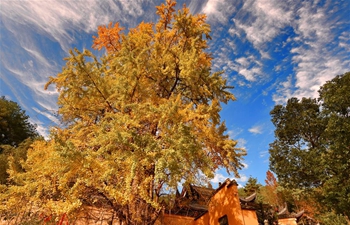by Duncan Murray
SYDNEY, Nov. 30 (Xinhua) -- A collaboration between Australian academics and Aboriginal rangers in the country's rural north has helped solve an ecological mystery and shown that local knowledge may still have a lot to offer.
When Yolngu elder and park ranger Yumutjin Jimmy Wunungmurra noticed that the paperbark forests which line the floodplains near his homeland were dying, his concern was for more than the environmental effects.
The paperbarks, or melaleuca, are of deep cultural significance to the local Aboriginals and are still used in cooking, medicines, for gathering water, as well as for building shelters and canoes and in ceremonial practices.
"That floodplain area used to be healthy and strong," Wunungmurra told Xinhua.
"We saw the plants dying and native animals disappearing and wanted to use science to understand how to help the land."
Wunungmurra's concerns reached scientists at Australia's Macquarie University (MU) and a partnership was established between university scientists and the environmental caretakers of the area, the Yirralka rangers, to understand why these valuable trees were dying and what the future might hold.
Lead MU researcher Daniel Sloane said his team began their investigation by asking Senior Knowledge Custodians (SKCs) across north-east Arnhem Land about how the land had changed during their lifetime and what factors they thought were behind the dieback of the trees.
According to Wunungmurra, they had noticed that mangrove trees were starting to grow further up onto the floodplains, which they knew meant that there was saltwater from the sea further up than it had been before.
Around 70 percent of the people that Sloane and his team spoke to blamed feral animals for the encroachment of the sea, explaining how pigs and buffalos, as hard hoofed animals, create channels which drives saltwater further inland and onto the freshwater floodplains.
When Sloane and his team tested this hypothesis with scientific methods, they confirmed what the locals had told them, that 70 percent of the dieback of the trees was related to salinity and feral animal damage.
"It was remarkable that Indigenous knowledge and western science achieved the same result," Sloane said, although he sees good reason why the local inhabitants displayed such a deep understanding of the land and its functions.
Indigenous people have been living on the Australian continent for an estimated 65,000 years, and their culture is considered one of the oldest on the planet.
The native people have a connection with the Australian environment, born by the necessities of surviving within it, as they did for millenia.
However things now are not as they once were.
"Today we feel like crying for the land," Wunungmurra said, "our spirit is on the land."
"Old people are usually passing knowledge from generation to generation (and) we were always thinking about what the old people were saying."
Increasingly Australians are beginning to pay attention to Aboriginal voices, including Commonwealth Scientific and Industrial Research Organization (CSIRO) scientist Dr Cathy Robinson who said that local knowledge is instrumental to the work she does.
On the East Coast of Australia, Robinson has led a project which involved performing controlled burns within Arakwal National Park, aimed at the rejuvenation of a local species of flower, the Byron Bay Orchid.
The local people from that area who are the Arakwal, in collaboration with CSIRO scientists have implemented a burning operation whereby sections of bush are set on fire to allow them to rejuvenate - an ancient custom, and one which many species actually require to stimulate seed release and new growth.
And the environment is not the only benefactor from having the traditional caretakers of the land doing what they do best - communities in the top end and across Australia are feeling the benefits of finding gainful employment which allows them to spend time in the bush.
"You can see with ranger work - it's real work," Robinson said.
"It's work that's about being on country and helping country you see some of those benefits to the environment but you also see cultural and social benefits."
Being out on country "reignites" knowledge, Robinson said, which from a scientific point of view arouses all sorts of useful insights and perspectives for her and her team to work with.
And for Wunungmurra, the benefits of collaboration flow both ways.
"Yolngu knowledge and western science help one another, we are sharing knowledge and working together," Wunungmurra said.
"We would like to see Yolngu people learning our culture and Western education too. We are living in two worlds - the Yolngu world and the Western world and we need more training in both."












